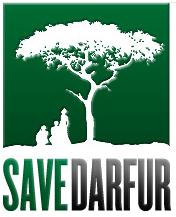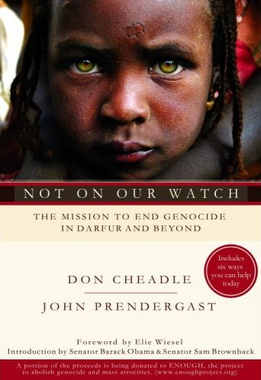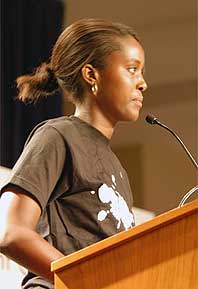
Darfur is a region of western Sudan. Dār is an Arabic word meaning "home [of]" – the region was named Dardaju while ruled by the Daju, who migrated from Meroë c. 350 AD, and it was renamed Dartunjur when the Tunjur ruled the area. Darfur was an independent sultanate for several hundred years until 1874, when it fell to the Sudanese warlord Rabih az-Zubayr. The region was later invaded and incorporated into Sudan by Anglo-Egyptian forces in 1916. As an administrative region, Darfur is divided into five federal states: Central Darfur, East Darfur, North Darfur, South Darfur and West Darfur. Because of the War in Darfur between Sudanese government forces and the indigenous population, the region has been in a state of humanitarian emergency and genocide since 2003. The factors include religious and ethnic rivalry, and the rivalry between farmers and herders.
The Genocide Intervention Network was a non-profit organization aiming to "empower individuals and communities with the tools to prevent and stop genocide". Founded in 2004, in 2005 the Genocide Intervention Fund changed its name to Genocide Intervention Network, and in 2011, it merged with the Save Darfur Coalition to form a new organization, United to End Genocide.

The African Union Mission in Sudan (AMIS) was an African Union (AU) peacekeeping force operating primarily in the country's western region of Darfur to perform peacekeeping operations related to the Darfur conflict. It was founded in 2004, with a force of 150 troops. By mid-2005, its numbers were increased to about 7,000. Under United Nations Security Council Resolution 1564, AMIS was to "closely and continuously liaise and coordinate ... at all levels" its work with the United Nations Mission in Sudan (UNMIS). AMIS was the only external military force in Sudan's Darfur region until UNAMID was established. It was not able to effectively contain the violence in Darfur. A more sizable, better equipped UN peacekeeping force was originally proposed for September 2006, but due to Sudanese government opposition, it was not implemented at that time. AMIS' mandate was extended repeatedly throughout 2006, while the situation in Darfur continued to escalate, until AMIS was replaced by UNAMID on 31 December 2007.
The Darfur Peace and Accountability Act or DPAA restates the United States government's position that the Darfur conflict constitutes genocide, and asks the government to expand the African Union peacekeeping force in Darfur (AMIS) and give the force a stronger mandate, including more generous logistical support. It also directs the government to assist the International Criminal Court in bringing justice to those guilty of war crimes. It was passed by the House and Senate and signed into law by President Bush on 13 October 2006 along with a companion executive order.

The War in Darfur, also nicknamed the Land Cruiser War, was a major armed conflict in the Darfur region of Sudan that began in February 2003 when the Sudan Liberation Movement (SLM) and the Justice and Equality Movement (JEM) rebel groups began fighting against the government of Sudan, which they accused of oppressing Darfur's non-Arab population. The government responded to attacks by carrying out a campaign of ethnic cleansing against Darfur's non-Arabs. This resulted in the death of hundreds of thousands of civilians and the indictment of Sudan's president, Omar al-Bashir, for genocide, war crimes, and crimes against humanity by the International Criminal Court.

The Save Darfur Coalition was an advocacy group that attempted "to raise public awareness and mobilize a massive response to the atrocities in Sudan's western region of Darfur." Headquartered in Washington, D.C., it was a coalition of more than 190 religious, political, and human rights organizations organized to campaign for a response to the atrocities of the War in Darfur, which culminated in a humanitarian crisis. By 2013, reports indicated that the conflict had claimed approximately 300,000 lives and had displaced over 2.5 million people.

This is the bibliography and reference section for the Darfur conflict series. External links to reports, news articles and other sources of information may also be found below.

While there is a consensus in the international community that ethnic groups have been targeted in Darfur and that crimes against humanity have therefore occurred, there has been debate in some quarters about whether genocide has taken place there. In May 2006, the International Commission of Inquiry on Darfur organized by United Nations "concluded that the Government of the Sudan has not pursued a policy of genocide ... [though] international offences such as the crimes against humanity and war crimes that have been committed in Darfur may be more serious and heinous than genocide." Eric Reeves, a researcher and frequent commentator on Darfur, has questioned the methodology of the commission's report.
Gérard Prunier is a French academic, historian, and consultant. He specializes in African history and affairs —particularly the Horn of Africa and the African Great Lakes regions.
Alexander William Lowndes de Waal, a British researcher on African elite politics, is the executive director of the World Peace Foundation at the Fletcher School of Law and Diplomacy at Tufts University. Previously, he was a fellow of the Harvard Humanitarian Initiative at Harvard University, as well as program director at the Social Science Research Council on AIDS in New York City.

Jewish World Watch (JWW) is a non-profit humanitarian organization dedicated to helping survivors of genocide and mass atrocities around the world.
The Aegis Trust, founded in 2000, is the British NGO which campaigns to prevent genocide worldwide. Based at the United Kingdom's Holocaust Centre, which opened in 1995, the Aegis Trust coordinates the UK Genocide Prevention All-Party Parliamentary Group, funds the Genocide Prevention Group (Canada) and is responsible for the Kigali Genocide Memorial Centre in Rwanda, which commemorates the 1994 genocide and is central to education of a new generation about the dangers of ethnic division.

Darfur is Dying is a flash-based browser game about the war in Darfur, western Sudan. The game won the Darfur Digital Activist Contest sponsored by mtvU. Released in April 2006, more than 800,000 people had played by September that year. It is classified as a serious game, specifically a newsgame.

Not On Our Watch: The Mission to End Genocide in Darfur and Beyond is a non-fiction book co-authored by actor Don Cheadle and human rights activist and co-founder of the Enough Project, John Prendergast.
Day for Darfur is an international advocacy campaign that works to bring together activists in cities around the globe in calling for action on the crisis in Darfur, western Sudan.
Ryan Spencer Reed is an American social documentary photographer. He has worked in Central and East Africa in the capacity of a photojournalist, covering the Sudanese Diaspora, since 2002. After returning from covering the War in Darfur in summer 2004, he and his work have moved around North America to universities in the form of traveling exhibitions and lectures. The Open Society Institute & Soros Foundation awarded him with the Documentary Photography Project's Distribution Grant in 2006.
The Enough Project is a Washington, D.C.-based non-profit organization that was founded in 2007. Its stated mission is to end genocide and crimes against humanity. The Enough Project conducts research in several conflict areas in Africa including Sudan, South Sudan, the Democratic Republic of the Congo, the Central African Republic, and the areas controlled by the Lord's Resistance Army (LRA). The Enough Project seeks to build leverage against the perpetrators and facilitators of atrocities and corruption through conducting research, engaging with governments and the private sector on policy solutions, and mobilizing public campaigns. Campaigns and initiatives aimed to bring attention to these crises include The Sentry and, previously, Raise Hope for Congo and the Satellite Sentinel Project.

John Prendergast is an American human rights and anti-corruption activist as well as an author. He is the co-founder of The Sentry, an investigative and policy organization that seeks to disable multinational predatory networks that benefit from violent conflict, repression, and kleptocracy. Prendergast was the founding director of the Enough Project and was formerly director for African affairs at the National Security Council.
Samuel Totten is an American professor of history noted for his scholarship on genocide. Totten was a distinguished professor at the University of Arkansas, Fayetteville where he taught from 1987 to 2012 and served as the chief editor of the journal Genocide Studies and Prevention. He is a Member of the Council of the Institute on the Holocaust and Genocide, Jerusalem.

The Darfur genocide was the systematic killing of ethnic Darfuri people during the War in Darfur. The genocide, which was carried out against the Fur, Masalit and Zaghawa ethnic groups, led the International Criminal Court (ICC) to indict several people for crimes against humanity, rape, forced transfer and torture. An estimated 200,000 people were killed between 2003 and 2005.












